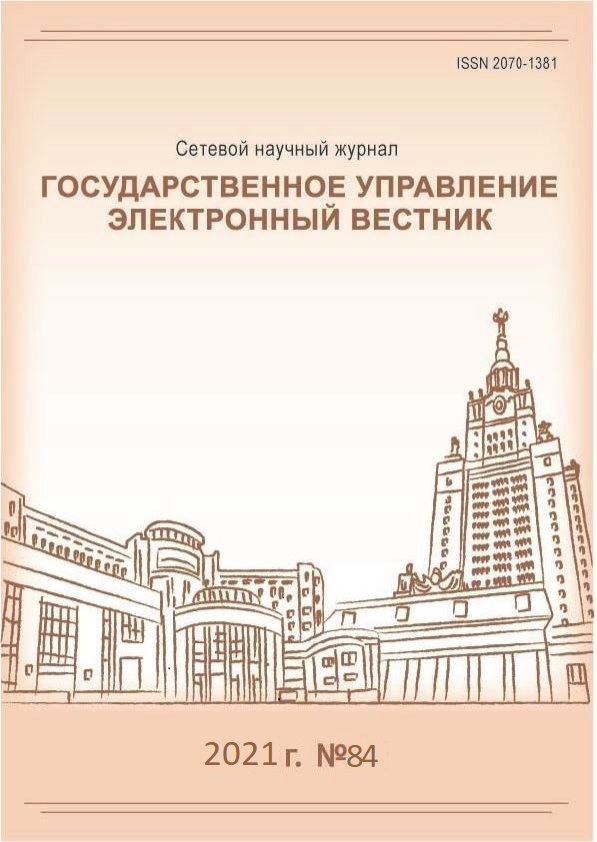Sovereignty as a Symbol of the Russian State Unity
Keywords:
Parade of sovereignties, The Constitution of the Russian Federation, political symbols, sovereignty, federalismAbstract
The article considers sovereignty as one of the key symbols of post-Soviet Russian statehood. The sovereignty proclaimed on June 12, 1990 became a key element for the Russian state system formation even before the collapse of the USSR. At the same time, the sovereignty adopted by the autonomous republics has become a threat to the Russia integrity. Understood in different ways, double-edged, used in political situations to justify different positions, sovereignty appears not only as a state and legal, but also a symbolic phenomenon combining different interpretations and meanings. Throughout the entire period of modern history, sovereignty remains one of the complex and contradictory phenomena of Russian statehood. In modern conditions, increased attention is again paid to state sovereignty in connection with the constitutional amendments of 2020 and the stated need to protect and strengthen the Russian Federation sovereignty. The article examines in detail the period when sovereignty became one of the key points of the federal structure discussion of drafting the Russian Constitution in 1993. During this period the issue of the state indivisibility sovereignty was seemingly resolved by adopting a new Constitution. The research is based on the constitutional process materials and uses the historical and genetic method. As a result, the author comes to the conclusion that the symbolic side of sovereignty requires special attention because of the unified sovereignty of the Russian state combining many meanings and associations is a multi-complex phenomenon.
References
Ефремова В.Н. О некоторых теоретических особенностях исследования символической политики // Символическая политика: сборник научных трудов. Вып. 3. М.: РАН, ИНИОН , 2015. С. 50–65.
Ефремова В.Н. Трансформация официальной символической политики в сфере государственных праздников в современной России // Политическая наука. 2014. № 3. С. 85–102.
История татар. Том VII. Татары и Татарстан в XX – начале XXI в. / Гл. ред.: Р. Хакимов. Казань: Институт истории АН РТ, 2013.
Лактионова Н.Я. «День России» и его история // Социально-гуманитарные знания. 2016. № 2. С. 244–250.
Малинова О.Ю. Символическая политика: контуры проблемного поля // Символическая политика: сборник научных трудов. Вып. 1. М.: РАН. ИНИОН, 2012. С. 5–16.
Малинова О.Ю. Стратегическая культура и фреймы коллективной памяти (на примере постсоветской России) // Вестник Пермского университета. Политология. 2018. № 1. С. 75–91. DOI: 10.17072/2218-1067-2018-1-75-91.
Скворцов Н.Г. Национальный вопрос и формирование российской национальной идентичности // Журнал Белорусского государственного университета. Социология. 2017. № 4. С. 101–105.
Тарасова Е.А., Шашонков П.А. Полиэтнические республики России в начале 1990-х гг.: третий этап «парада суверенитетов» // Russian Colonial Studies. 2020. № 1(5). С. 112–141. DOI: 10.24411/2686-9217-2020-10006.
Edelman M. Politics as Symbolic Action. Mass Arousal and Quiescence. Chicago: Markham publishing company, 1971.
Edelman M. The Symbolic Uses of Politics. Chicago: University of Illinois press, 1972.
Gill G. Symbolism and Regime Change: Russia. Cambridge: Cambridge university press, 2013.
Smith K.E. Mythmaking in the New Russia: Politics and Memory in the Yeltsin Era. Ithaca: Cornell university press, 2002.
Downloads
Published
How to Cite
Similar Articles
- Vladimir Yu. Razumovsky, Regional Regimes of Government in the Context of Russian Federalism Genesis: Essence, Contradictions, Results of Activity , Public Administration. E-journal (Russia): No. 88 (2021)
- Albina B. Romashkina, Managing the Digital Space of Political Communications: Current Challenges , Public Administration. E-journal (Russia): No. 101 (2023)
- Andrei A. Salnikov, The Government Reform of 1993–1994 in Russian Federation: Background, Course and Results , Public Administration. E-journal (Russia): No. 91 (2022)
- Mikhail S. Filatov, Historical Experience of Applying the Principles of the Right of Peoples to Self-Determination and the Territorial Integrity of States on the Territory of the Post-Soviet Space , Public Administration. E-journal (Russia): No. 102 (2024)
- Yulia V. Yevstafyeva PhD, School of Public Administration, Lomonosov Moscow State University, Moscow, Russian Federation, Special Investment Contracts of New Edition — SPIC 2.0: Features of Use and Perspectives , Public Administration. E-journal (Russia): No. 99 (2023)
- Roman V. Evstifeev, “Civilization State” Concept in the Works of Non-Western Scholars , Public Administration. E-journal (Russia): No. 104(S) (2024): The Concept of Russian Civilization: New Trends in Scientific Discussions
- Galina V. Pushkareva, Vladislav V. Sychev, Political Institutional Trust in the Russian Society , Public Administration. E-journal (Russia): No. 100 (2023)
- Vladimir O. Mikryukov, Arina V. Koroleva, Petr P. Shevel, Election Results Expert’s Forecasting: Advantages and Disadvantages (on the Example of the Elections of the State Duma of the Federal Assembly of the Russian Federation of the 8th convocation) , Public Administration. E-journal (Russia): No. 93 (2022)
- Antonina V. Selezneva, Azamat Kh. Tomaev, Alexandra A. Khatkevich, Youth Political Leadership in Institutional Dimension: Shaping Environment and Development Features , Public Administration. E-journal (Russia): No. 98 (2023)
- Anastasiya A. Zhokhova, Problems of Developing Researches on Women’s Political Leadership: A Bibliometric Analysis , Public Administration. E-journal (Russia): No. 106 (2024)
You may also start an advanced similarity search for this article.




